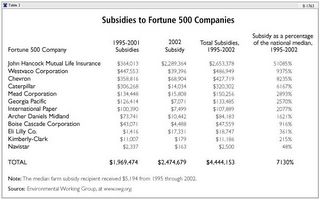Farming may be the most federally subsidized profession in America. The persistence of farm subsidy programs results from the popular misconception that they stabilize the incomes of poor family farmers who are at the mercy of unpredictable weather and crop prices. Yet a recent U.S. Department of Agriculture report concluded that, "On average, farm households have higher incomes, greater wealth, and lower consumption expenditures than all U.S. households."Moreover, much farm funding goes to agri-business, not the "Grapes of Wrath" archetype struggling family farmer:
A glance at those who received farm subsidies in 2002 shows that many of them do not need federal dollars. Table 2 shows the 12 Fortune 500 companies that received farm subsidies in 2002. John Hancock Mutual Life Insurance's $2.3 million farm subsidy payment was by far the largest among these companies. The farm subsidies granted to these Fortune 500 companies since 1995 are--on average--70 times larger than those granted to the median farmer.

Welfare for Agri-biz (click to enlarge)
Another large percentage of the bail-out goes to millionaires whose farms grow only tax shelters:

The Rich Get Richer (click to enlarge)
The Environmental Working Group has a nifty interactive map providing state-by-state, county-by-county data on farm subsidy recipients.
Agricultural subsidies are a global problem, impoverishing the developing world and -- so far -- scuttling current efforts to negotiate increased trade liberalization within the WTO. Subsidies have been politically untouchable in middle America, for two reasons.
- Half of the states are net recipients of farm subsidies, meaning they're "over-represented" in the Senate. In Washington, the mid-West is know as "the square states" or "the farm team," a political bloc seeking subsidies that's tough to defeat.
- The romance of the humble "family farmer," reinforced by Sally Field movies and Willy Nelson concerts, is a myth that's long outlived reality, but still tugs the heart-string and attracts votes.
Atrios and Josh Claybourn think Bush isn't serious. They may be right. But the President's willingness to stand firm may depend on the mainstream media's reactions. And that jury's still out, says Rightpundit:
When it comes time to talk about the proposed cuts in the farm subsidies, will the old media interview and show pictures of Ted Turner and Ken Lay or will they interview and show pictures of a family farmer in overalls on his old tractor? This will be interesting because the old media has never been a fan of the rich getting federal money, but will they do anything that gives credit to President Bush?Probably not--especially Sam Donaldson and Ted Turner.
More:
Reggie's Corner mentions Bush's proposed farm subsidy cuts.
Still More:
The New Republic praises the proposal, yet still blames Bush. Says NR's Ramesh Ponnuru, they
hate Bush so much that they can't give him any credit for it. Their excuse is that Bush clearly doesn't intend for his proposal to pass, and the evidence they provide for that view basically amounts to their own distrust of him. This is not serious thought.
No comments:
Post a Comment